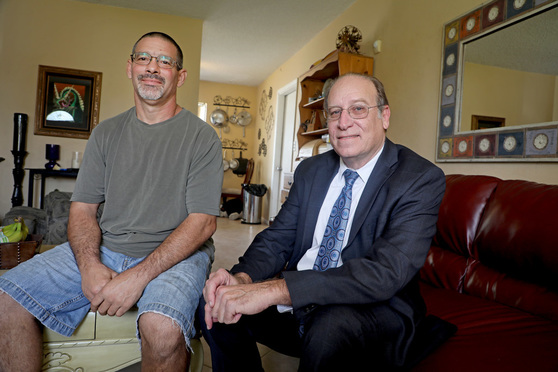How a Florida Supreme Court Case Could Affect Attorney Pay
Twelve law firms and legal aid groups weigh in with friend-of-the-court briefs in a case where a homeowner beat back a foreclosure lawsuit.
April 24, 2018 at 04:18 PM
5 minute read
 Homeowner Jerry Warren, left, with his attorney Michael Wrubel. Photo: J. Albert Diaz/ALM
Homeowner Jerry Warren, left, with his attorney Michael Wrubel. Photo: J. Albert Diaz/ALM
A Florida Supreme Court case that could affect attorney income is getting widespread attention and attracting participation from firms not involved in the litigation.
Twelve firms and legal aid groups have weighed in with amicus briefs in Marie Ann Glass v. Nationstar Mortgage et al., which centers on the power to charge legal fees in mortgage foreclosures.
But most observers say the implications go well beyond the real estate sector. They say Glass could have far-reaching implications on contract law, affecting any deals involving assets assigned from one owner to the next.
They also say thousands of Florida homeowners hit by the last housing market collapse are watching to see if the lawyers who've represented them for years will be able to collect fees from the banks and lenders who took them to court.
Watch the video:
“This is really about having meaningful participation in the court process,” said Mandy Mills, senior attorney at Legal Services of Greater Miami Inc., which filed a friend-of-the-court brief. ”The system is just more fair when both sides have an attorney to represent them.”
Mills said upholding Glass would discourage attorneys from defending homeowners if the lawyers couldn't collect fees from defeated plaintiffs.
Plus, critics say a ruling in favor of Nationstar would leave banks with nothing to lose: Lenders would recover property if they won and pay nothing to defendants if they lost.
“The bank has no risk,” said Lynn Drysdale, division chief of consumer advocacy and litigation at Jacksonville Area Legal Aid Inc. “If they bring a bad lawsuit under the present reading of Glass, so what?”
'HOW TO STAY HERE'
Foreclosure defendant Jerry Warren has been tracking the case because of what it will mean for his own litigation over his Davie home.
Warren said he paid a $100,000 deposit on a $512,000 property in suburban Broward County in 2006. He said he was supposed to pay $1,800 a month on the adjustable rate mortgage, but that number ratcheted up to $2,300, then $3,000 before reaching $3,800 as the housing crash took hold and investors traded his debt.
“There was no end to it. It was as if they were rewriting the mortgage every time the loan changed hands,” Warren said. “We never thought of it as a legal issue. We just wanted to figure out how to stay here. We never thought we were going to be in foreclosure.”
Now, Warren fears his foreclosure defense attorney, Michael Wrubel, won't be able to recoup fees from the lenders who've pursued him for years.
“This is a very important case to consumers and debtors because many of the cases that they prevail upon in foreclosure are based upon standing, or whether the plaintiff has the right to enforce the contract,” Wrubel said. “What it comes down to is that the courts have taken away from attorneys the ability to get attorneys' fees.”
Most of the briefs in the Florida Supreme Court support the petitioner, Glass. They ask the high court to overturn an appellate ruling that turned on whether Nationstar had the right to bring a lawsuit against Glass in Broward Circuit Court and whether it owes her attorney fees after dropping the complaint.
American Legal and Financial Network, a trade group representing firms in the legal and financial services industries, filed on Nationstar's behalf.
Nationstar attorney Marc James Ayers did not respond to requests for comment, nor did attorney David Rosenberg, who represents supporter American Legal and Financial Network.
The homeowner's supporters include The Ticktin Law Group, Brevard County Legal Aid Inc., Korte & Wortman, Jacksonville Area Legal Aid Inc., Florida Legal Aid and Legal Services Consumer Group, Legal Services of Greater Miami Inc., Florida Alliance for Consumer Protection, Oppenheim Law and Michael Jay Wrubel P.A.
Glass reached the high court after an appellate panel rejected the homeowner's argument that Florida Statute Section 57.105(7) allowed for reciprocity, permitting borrowers to collect legal fees under contracts that make the provision only for lenders.
Glass argued her loan documents allowed the financial institution to claim attorney fees if it brought suit against her and prevailed. The contract made no similar provision for the borrower. But Glass claimed Florida law recognized the inherent imbalance of power in lending contracts, and legislators created Section 57.105 to allow the borrower to collect fees.
When Nationstar filed a notice of voluntary dismissal on appeal, Glass claimed victory. She argued that as the prevailing party, she was eligible to recoup appellate legal fees from the financial institution that sued her.
The Fourth District Court of Appeal seemed to agree with Glass' stance. But it found one of the homeower's own arguments — the plaintiff looking to foreclose on her mortgage was not the one with the legal standing to do so — torpedoed her case.
If Nationstar were not a party to Glass' contract, the company did not owe legal fees under that same contract, the appellate court ruled.
That's the issue worrying the law firms that stepped into the fray in the Supreme Court case.
“The banks are trying to suck the oxygen out … and prevent homeowners from getting guys like me to do my job,” said foreclosure defense attorney Roy Oppenheim of Weston. “It just has a very bad smell to it.”
This content has been archived. It is available through our partners, LexisNexis® and Bloomberg Law.
To view this content, please continue to their sites.
Not a Lexis Subscriber?
Subscribe Now
Not a Bloomberg Law Subscriber?
Subscribe Now
NOT FOR REPRINT
© 2025 ALM Global, LLC, All Rights Reserved. Request academic re-use from www.copyright.com. All other uses, submit a request to [email protected]. For more information visit Asset & Logo Licensing.
You Might Like
View All
South Florida Real Estate Lawyers See More Deals Flow, But Concerns Linger
6 minute read
Vedder Price Shareholder Javier Lopez Appointed to Miami Planning, Zoning & Appeals Board
2 minute read
Real Estate Trends to Watch in 2025: Restructuring, Growth, and Challenges in South Florida
3 minute readTrending Stories
- 1States Accuse Trump of Thwarting Court's Funding Restoration Order
- 2Microsoft Becomes Latest Tech Company to Face Claims of Stealing Marketing Commissions From Influencers
- 3Coral Gables Attorney Busted for Stalking Lawyer
- 4Trump's DOJ Delays Releasing Jan. 6 FBI Agents List Under Consent Order
- 5Securities Report Says That 2024 Settlements Passed a Total of $5.2B
Who Got The Work
J. Brugh Lower of Gibbons has entered an appearance for industrial equipment supplier Devco Corporation in a pending trademark infringement lawsuit. The suit, accusing the defendant of selling knock-off Graco products, was filed Dec. 18 in New Jersey District Court by Rivkin Radler on behalf of Graco Inc. and Graco Minnesota. The case, assigned to U.S. District Judge Zahid N. Quraishi, is 3:24-cv-11294, Graco Inc. et al v. Devco Corporation.
Who Got The Work
Rebecca Maller-Stein and Kent A. Yalowitz of Arnold & Porter Kaye Scholer have entered their appearances for Hanaco Venture Capital and its executives, Lior Prosor and David Frankel, in a pending securities lawsuit. The action, filed on Dec. 24 in New York Southern District Court by Zell, Aron & Co. on behalf of Goldeneye Advisors, accuses the defendants of negligently and fraudulently managing the plaintiff's $1 million investment. The case, assigned to U.S. District Judge Vernon S. Broderick, is 1:24-cv-09918, Goldeneye Advisors, LLC v. Hanaco Venture Capital, Ltd. et al.
Who Got The Work
Attorneys from A&O Shearman has stepped in as defense counsel for Toronto-Dominion Bank and other defendants in a pending securities class action. The suit, filed Dec. 11 in New York Southern District Court by Bleichmar Fonti & Auld, accuses the defendants of concealing the bank's 'pervasive' deficiencies in regards to its compliance with the Bank Secrecy Act and the quality of its anti-money laundering controls. The case, assigned to U.S. District Judge Arun Subramanian, is 1:24-cv-09445, Gonzalez v. The Toronto-Dominion Bank et al.
Who Got The Work
Crown Castle International, a Pennsylvania company providing shared communications infrastructure, has turned to Luke D. Wolf of Gordon Rees Scully Mansukhani to fend off a pending breach-of-contract lawsuit. The court action, filed Nov. 25 in Michigan Eastern District Court by Hooper Hathaway PC on behalf of The Town Residences LLC, accuses Crown Castle of failing to transfer approximately $30,000 in utility payments from T-Mobile in breach of a roof-top lease and assignment agreement. The case, assigned to U.S. District Judge Susan K. Declercq, is 2:24-cv-13131, The Town Residences LLC v. T-Mobile US, Inc. et al.
Who Got The Work
Wilfred P. Coronato and Daniel M. Schwartz of McCarter & English have stepped in as defense counsel to Electrolux Home Products Inc. in a pending product liability lawsuit. The court action, filed Nov. 26 in New York Eastern District Court by Poulos Lopiccolo PC and Nagel Rice LLP on behalf of David Stern, alleges that the defendant's refrigerators’ drawers and shelving repeatedly break and fall apart within months after purchase. The case, assigned to U.S. District Judge Joan M. Azrack, is 2:24-cv-08204, Stern v. Electrolux Home Products, Inc.
Featured Firms
Law Offices of Gary Martin Hays & Associates, P.C.
(470) 294-1674
Law Offices of Mark E. Salomone
(857) 444-6468
Smith & Hassler
(713) 739-1250







